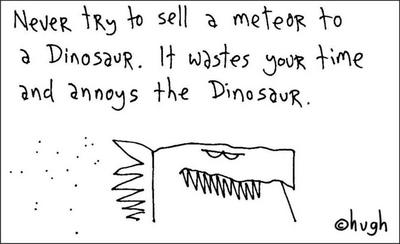TITLE: Headline: "Dinosaurs Object to Meteor's Presence"
AUTHOR: Eugene Wallingford
DATE: July 24, 2013 11:44 AM
DESC:
-----
BODY:
Nate Silver recently announced that he is leaving the New
York Times for ESPN. Margaret Sullivan
offers some observations on the departure,
into how political writers at the Times viewed Silver and
his work:
... Nate disrupted the traditional model of how to cover
politics.
His entire probability-based way of looking at politics ran
against the kind of political journalism that The Times
specializes in: polling, the horse race, campaign coverage,
analysis based on campaign-trail observation, and opinion
writing. ...
His approach was to work against the narrative of politics.
...
A number of traditional and well-respected Times journalists
disliked his work. The first time I wrote about him I
suggested that print readers should have the same access to
his writing that online readers were getting. I was
surprised to quickly hear by e-mail from three high-profile
Times political journalists, criticizing him and his work.
...
Maybe Silver decided to acquiesce to
Hugh MacLeod's advice.
Maybe he just got a better deal.
The world changes, whether we like it or not. The New York
Times and its journalists probably have the reputation, the
expertise, and the strong base they need to survive the ongoing
changes in journalism, with or without Silver. Other
journalists don't have the luxury of being so cavalier.
I don't know any more attitudes inside the New York Times than
what I see reported in the press, but Sullivan's article made
me think of one of Anil Dash's
ten rules of the internet:
When a company or industry is facing changes to its business
due to technology, it will argue against the need for change
based on the moral importance of its work, rather than trying
to understand the social underpinnings.
I imagine that a lot of people at the Times are indeed trying
to understand the social underpinnings of the changes occurring
in the media and trying to respond in useful ways. But that
doesn't mean that everyone on the inside is, or even that the
most influential and high-profile people in the trenches are.
And that's adds an internal social challenge to the external
technological challenge.
Alas, we see much the same dynamic playing out in universities
across the country, including my own. Some dinosaurs have been
around for a long time. Others are near the beginning of their
careers. The internal social challenges are every bit as
formidable as the external economic and technological ones.
-----

